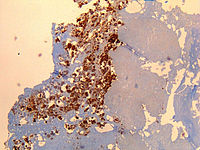
Photo from wikipedia
Coxiella burnetii (order Legionellales, family Coxiellaceae), the etiological agent of Q fever, is a pleomorphic, obligate Gram-negative intracellular bacillococcus that can infect humans and animals. Among the mammals hosting this… Click to show full abstract
Coxiella burnetii (order Legionellales, family Coxiellaceae), the etiological agent of Q fever, is a pleomorphic, obligate Gram-negative intracellular bacillococcus that can infect humans and animals. Among the mammals hosting this agent, both domestic and wild ruminants are of particular economic and public health importance. Ticks and other hematophagous arthropods or aerosols are incriminated in the transmission between reservoirs and susceptible hosts. This study used serological and molecular methods to investigate the C. burnetii occurrence in blood samples from free-living deer (143 Blastocerus dichotomus, 27 Mazama gouazoubira, 4 M. bororo, 3 M. americana, and 11 Ozotocerus bezoarticus) sampled in Mato-Grosso do Sul, São Paulo, Goiás and Paraná states in Brazil. The DNA extracted from the blood samples of 188 cervids was submitted to nested (n) PCR for C. burnetii based on the IS1111 repetitive insertion element of the heat shock protein (htpAB) gene. Additionally, 169 serum samples were submitted to Indirect Immunofluorescence Assay (IFAT) to detect Ig antibodies to C. burnetii. The nPCR results indicated that all blood samples were negative, evidencing the absence of circulating C. burnetii DNA in cervids from the studied regions or, alternatively, the C. burnetii DNA concentration in the deer blood samples was below the threshold of the used PCR technique. On the other hand, 5.32% (9/169) of deer were seropositive for C. burnetii by IFAT, with titers ranging from 256 and 16,384. In conclusion, the present work showed the first evidence of exposure of free-living deer to C. burnetii in Brazil.
Journal Title: Acta tropica
Year Published: 2019
Link to full text (if available)
Share on Social Media: Sign Up to like & get
recommendations!